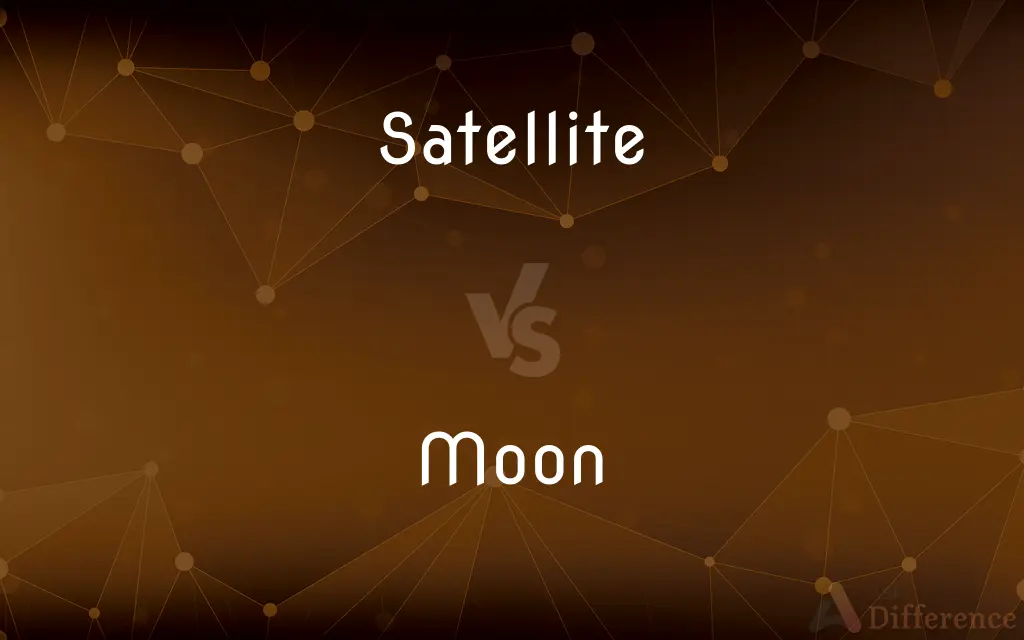Satellite vs. Moon — What's the Difference?
By Tayyaba Rehman — Updated on November 3, 2023
A satellite is any object that orbits a planet, while a moon is a natural satellite specifically orbiting a planet. Satellites can be man-made or natural; moons are always natural.

Difference Between Satellite and Moon
Table of Contents
ADVERTISEMENT
Key Differences
A satellite is a general term for any object that orbits around a larger body in space; this includes both man-made objects like communications satellites and natural objects like moons. The word "moon," however, is used exclusively to describe natural satellites that orbit planets.
Satellites can vary widely in their purpose and design, especially when considering artificial satellites, which are used for communication, weather monitoring, and scientific research. Moons, in contrast, are natural celestial bodies that have formed from the accumulation of space debris in the orbit of a planet, often playing key roles in affecting that planet's tides and sometimes its climate.
In terms of nomenclature, satellites are named based on their function or the mission they are a part of, such as the Hubble Space Telescope. Moons are usually named after mythological characters or figures from the history of astronomy, like Jupiter's moons Ganymede and Callisto.
The function of satellites can be quite diverse: some satellites are designed to observe Earth, others are meant for deep space exploration. Moons, however, do not have a designed function but can be studied to understand more about planetary formation and the conditions of their respective planets.
While all moons are satellites by definition, not all satellites are moons. Satellites include a broad category of man-made and natural objects in orbit, while the term "moon" is a specific subtype within that broad category, referring to a certain kind of natural satellite.
ADVERTISEMENT
Comparison Chart
Definition
Any object that orbits a planet
A natural satellite of a planet
Types
Natural and artificial
Only natural
Purpose/Function
Diverse, including technology
None designed; affects tides
Naming
Functional or mission-related
Mythological or historical
Exclusivity
Broad term including many objects
Exclusive to natural bodies
Compare with Definitions
Satellite
Man-made equipment launched for communication or observation
A new weather satellite was launched to monitor climate changes.
Moon
A natural satellite orbiting a planet
The Earth’s moon affects the ocean tides.
Satellite
Any object in space that orbits a planet
The International Space Station is a satellite that orbits Earth.
Moon
An astronomical body visible at various phases
The full moon shone brightly last night.
Satellite
A celestial body captured in the orbit of a planet
Saturn’s rings are made up of millions of small ice satellites.
Moon
A solid body that reflects sunlight and orbits a planet
The moon’s craters are visible through a telescope.
Satellite
An object that revolves around a larger object in space
The satellite orbited the moon, collecting data.
Moon
The Moon is Earth's only natural satellite. At about one-quarter the diameter of Earth (comparable to the width of Australia), it is the largest natural satellite in the Solar System relative to the size of its planet, the fifth largest satellite in the Solar System overall, and is larger than any known dwarf planet.
Satellite
An artificial object placed in orbit for scientific or military purposes
The spy satellite could take high-resolution images of the Earth’s surface.
Moon
Often Moon The natural satellite of Earth, visible by reflection of sunlight and having a slightly elliptical orbit, approximately 363,100 kilometers (225,600 miles) distant at perigee and 405,700 kilometers (252,100 miles) at apogee. Its mean diameter is 3,475 kilometers (2,159 miles), its mass approximately one eightieth that of Earth, and its average period of revolution around Earth 29 days 12 hours 44 minutes calculated with respect to the sun.
Satellite
In the context of spaceflight, a satellite is an object that has been intentionally placed into orbit. These objects are called artificial satellites to distinguish them from natural satellites such as Earth's Moon.
Moon
A natural satellite revolving around a planet.
Satellite
An object launched to orbit Earth or another celestial body, as a device for reflecting or relaying radio signals or for capturing images.
Moon
The moon as it appears at a particular time in its cycle of phases
A gibbous moon.
Satellite
(Astronomy) A celestial body, such as a moon, planet, comet, or other solar system body, that orbits a larger body.
Moon
A month, especially a lunar month.
Satellite
A small unit in a system or organization that is managed or controlled by a larger, often centrally located unit.
Moon
A disk, globe, or crescent resembling the natural satellite of Earth.
Satellite
A nation dominated politically and economically by another nation.
Moon
Moonlight.
Satellite
An urban or suburban community located near a big city.
Moon
Something unreasonable or unattainable
They acted as if we were asking for the moon.
Satellite
One who attends a powerful dignitary; a subordinate.
Moon
(Slang) The bared buttocks.
Satellite
A subservient follower; a sycophant.
Moon
To wander about or pass time languidly and aimlessly.
Satellite
(Genetics) A short segment of a chromosome separated from the rest by a constriction, typically associated with the formation of a nucleolus.
Moon
To yearn or pine as if infatuated.
Satellite
(Microbiology) A colony of microorganisms whose growth in culture medium is enhanced by certain substances produced by another colony in its proximity.
Moon
(Slang) To expose one's buttocks in public as a prank or disrespectful gesture.
Satellite
Of, relating to, or being a satellite.
Moon
(Slang) To expose one's buttocks to (others) as a prank or disrespectful gesture
"threatened to moon a passing ... camera crew" (Vanity Fair).
Satellite
Of or relating to the transmission of electromagnetic signals by communications satellite
Satellite broadcasting.
Satellite phone.
Moon
Senseid|en|Q405}} {{alternative case form of Moon.
Satellite
A moon or other smaller body orbiting a larger one.
The Moon is a natural satellite of the Earth.
A spent upper stage is a derelict satellite.
Moon
Any natural satellite of a planet.
The stargazer observed the moons of Jupiter for over a year.
That's no moon, you idiot... it's a space station!
Satellite
A man-made apparatus designed to be placed in orbit around a celestial body, generally to relay information, data etc. to Earth.
Many telecommunication satellites orbit at 36000km above the equator.
Moon
(literary) A month, particularly a lunar month.
They stayed with their aunt and uncle for many moons.
Satellite
A country, state, office, building etc. which is under the jurisdiction, influence, or domination of another body.
Moon
A representation of the moon, usually as a crescent or as a circle with a face; a crescent-shaped shape, symbol, or object.
The wizard costume was decorated with stars and moons.
Satellite
An attendant on an important person; a member of someone's retinue, often in a somewhat derogatory sense; a henchman.
Moon
A crescent-like outwork in a fortification.
The moons surrounding the city walls were built in the sixteenth century.
Satellite
Satellite TV; reception of television broadcasts via services that utilize man-made satellite technology.
Do you have satellite at your house?
Moon
The eighteenth trump/major arcana card of the Tarot.
Satellite
(grammar) A grammatical construct that takes various forms and may encode a path of movement, a change of state, or the grammatical aspect. Examples: "a bird flew past"; "she turned on the light".
Moon
(cartomancy) The thirty-second Lenormand card.
Satellite
To transmit by satellite.
Moon
(card games) In hearts, the action of taking all the point cards in one hand.
Satellite
An attendant attached to a prince or other powerful person; hence, an obsequious dependent.
Moon
To display one's buttocks to, typically as a jest, insult, or protest.
The hooligans mooned the riot police.
It was ill-advised of Sam to moon the photographer during the shoot.
Satellite
A secondary planet which revolves about another planet; as, the moon is a satellite of the earth. See Solar system, under Solar.
Moon
To gaze at lovingly or in adoration.
Satellite
Situated near; accompanying; as, the satellite veins, those which accompany the arteries.
Moon
(usually followed by over or after) To fuss over something adoringly; to be infatuated with someone.
Sarah mooned over Sam's photograph for months.
You've been mooning after her forever; why not just ask her out?
Satellite
Man-made equipment that orbits around the earth or the moon
Moon
To spend time idly, absent-mindedly.
Satellite
A person who follows or serves another
Moon
(transitive) To expose to the rays of the Moon.
Satellite
Any celestial body orbiting around a planet or star
Moon
(transitive) To adorn with moons or crescents.
Satellite
Broadcast or disseminate via satellite
Moon
To rise in price rapidly or suddenly.
It is impractical if a currency moons and plummets often.
Satellite
Surrounding and dominated by a central authority or power;
A city and its satellite communities
Moon
(card games) To shoot the moon.
Moon
The celestial orb which revolves round the earth; the satellite of the earth; a secondary planet, whose light, borrowed from the sun, is reflected to the earth, and serves to dispel the darkness of night. The diameter of the moon is 2,160 miles, its mean distance from the earth is 240,000 miles, and its mass is one eightieth that of the earth. See Lunar month, under Month.
The crescent moon, the diadem of night.
Moon
A secondary planet, or satellite, revolving about any member of the solar system; as, the moons of Jupiter or Saturn.
Moon
The time occupied by the moon in making one revolution in her orbit; a month.
Moon
A crescentlike outwork. See Half-moon.
Moon
The deliberately exposed naked buttocks.
Moon
To expose to the rays of the moon.
If they have it to be exceeding white indeed, they seethe it yet once more, after it hath been thus sunned and mooned.
Moon
To expose one's naked buttocks to (a person); - a vulgar sign of contempt or disrespect, sometimes done as a prank.
Moon
To act if moonstruck; to wander or gaze about in an abstracted manner.
Elsley was mooning down the river by himself.
Moon
The natural satellite of the Earth;
The average distance to the moon is 384,400 kilometers
Men first stepped on the moon in 1969
Moon
Any object resembling a moon;
He made a moon lamp that he used as a night light
The clock had a moon that showed various phases
Moon
The period between successive new moons (29.531 days)
Moon
The light of the moon;
Moonlight is the smuggler's enemy
The moon was bright enough to read by
Moon
United States religious leader (born in Korea) who founded the Unification Church in 1954; was found guilty of conspiracy to evade taxes (born in 1920)
Moon
Any natural satellite of a planet;
Jupiter has sixteen moons
Moon
Have dreamlike musings or fantasies while awake;
She looked out the window, daydreaming
Moon
Be idle in a listless or dreamy way
Moon
Expose one's buttocks to;
Moon the audience
Moon
The celestial body closest to Earth
Astronauts first landed on the moon in 1969.
Moon
The object of many mythologies and romantic notions
The moon has been a muse for poets for centuries.
Common Curiosities
Can moons be considered satellites?
Yes, all moons are naturally occurring satellites.
Do satellites always orbit planets?
Satellites can orbit planets, other moons, or even stars.
How do satellites stay in orbit?
Satellites stay in orbit due to the balance of gravitational forces and their momentum.
Are all satellites man-made?
No, satellites can be either natural, like moons, or artificial, like communication satellites.
How are moons formed?
Moons form from dust and rock circling a planet, which eventually clumps together due to gravity.
Are moons always round?
Moons tend to be round due to gravity, but some smaller ones may be irregularly shaped.
How many moons does Earth have?
Earth has one moon.
What's the difference between a satellite and a space station?
A space station is a type of artificial satellite designed for humans to live and work in space.
What defines a satellite?
A satellite is any object that orbits around a larger body in space.
Do all planets have moons?
Not all planets have moons; Mercury and Venus, for example, do not have any.
Can the term 'moon' refer to an artificial satellite?
No, 'moon' refers exclusively to natural satellites.
Can satellites collide with moons?
Yes, if their orbits intersect, satellites can collide with moons.
What is the primary function of a man-made satellite?
The functions vary but often include communications, observations, navigation, and research.
Do satellites need fuel to operate?
Artificial satellites need fuel for positioning and orbit adjustments, but natural satellites like moons do not.
Are moons exclusive to our solar system?
No, moons have been discovered orbiting planets in other solar systems.
Share Your Discovery

Previous Comparison
Telegram vs. Telegraph
Next Comparison
Practical vs. ExperimentAuthor Spotlight
Written by
Tayyaba RehmanTayyaba Rehman is a distinguished writer, currently serving as a primary contributor to askdifference.com. As a researcher in semantics and etymology, Tayyaba's passion for the complexity of languages and their distinctions has found a perfect home on the platform. Tayyaba delves into the intricacies of language, distinguishing between commonly confused words and phrases, thereby providing clarity for readers worldwide.















































